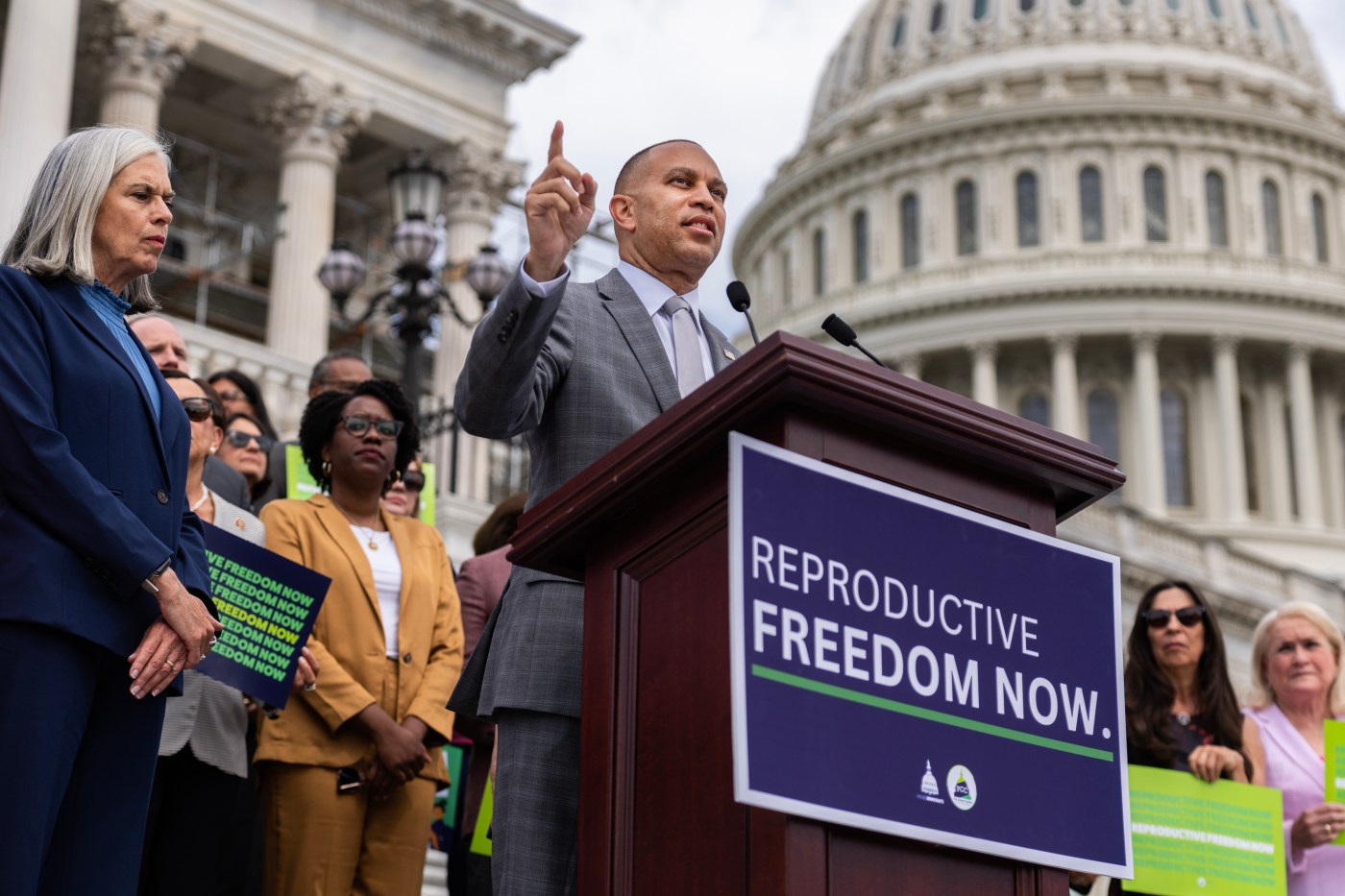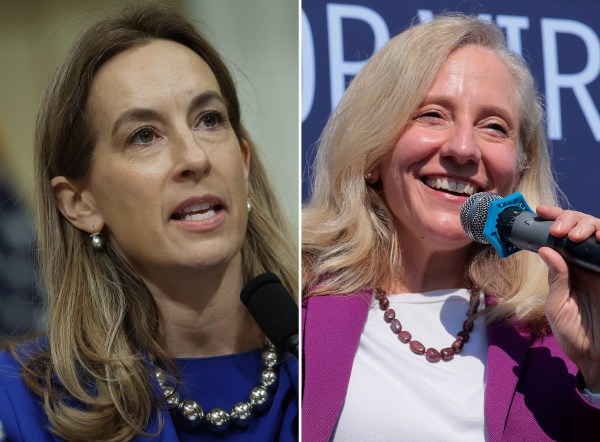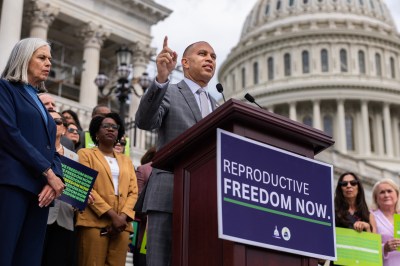Turn any article into a podcast. Upgrade now to start listening.
Premium Members can share articles with friends & family to bypass the paywall.
If Democrats really want to root out the danger they say President Donald Trump poses to American democracy, they will need to win majorities in Congress. Their move to shut down the government last week—a tactic that does not have a track record of success in terms of obtaining desired policy outcomes—is likely the most they can do when Republicans hold a governing trifecta.
To win seats and gain the ability to oppose Trump more effectively, liberal New York Times columnist Ezra Klein is arguing that Democrats should make some short-term political compromises. “My view,” he said on a recent podcast, “is that a lot of people who embrace alarm don’t embrace what I think obviously follows from that alarm, which is the willingness to make strategic and political decisions you find personally discomfiting, even though they are obviously more likely to help you win. Taking political positions that’ll make it more likely to win Senate seats in Kansas and Ohio and Missouri. Trying to open your coalition to people you didn’t want it open to before. Running pro-life Democrats.”
His suggestion was unpopular among the constituency of a Democratic Party that in recent years has become especially closed off to candidates who do not take the party line on abortion. But on Capitol Hill, Democratic members of Congress contending with the decisive loss they suffered in November and looking ahead to the 2026 midterm elections are not completely dismissing the idea of welcoming candidates who diverge from the party orthodoxy on abortion.
None of the Democrats who spoke to The Dispatch about the issue this week completely closed the door on it, stressing instead the need to field winning candidates, period.
“The most important thing we have to do is win the majority in 2026,” said Illinois Rep. Brad Schneider, the head of the center-left New Democrat Coalition. “We’re going to fight and win—try to win—in every district across the country. Every district is going to be running candidates that reflect the values and priorities of that district.”
His colleague, Rep. Jamie Raskin of Maryland, noted that he has worked with anti-Trump former Reps. Liz Cheney and Adam Kinzinger, as well as former Sen. Mitt Romney, despite their differing views on abortion, and denied that his party was closed off to pro-life candidates.
“I have not heard of any candidate being driven out of our party because of their point of view,” he said. “If they want to enter Democratic primaries and run, and they can win, then more power to them. If they can’t do that, well, then that’s the way democracy works.”
Polling last year by Pew Research found that just 14 percent of people who identify as Democrats or lean Democrat believe abortion should be illegal in all or most cases. Accordingly, the number of pro-life Democrats in the party has dwindled. Only one Democrat in Congress, Rep. Henry Cuellar of Texas, has a record of opposing abortion. (Because he represents a swing district, the Democratic Congressional Campaign Committee, a party campaign arm that works to get candidates elected to the House, is directing extra resources to Cuellar’s 2026 campaign—during which he will need to fend off attacks regarding his upcoming bribery trial.)
At the 2024 Democratic National Convention, the group Democrats for Life staged an event at which it complained its members felt shut out of influence in the party, even though the organization once boasted 43 pro-life members in Congress. One of the event’s speakers, the pro-life former Illinois Rep. Dan Lipinski, lost a primary challenge in 2020 to a candidate backed by abortion rights groups after serving eight terms. He has been a proponent of Klein’s call for Democrats to embrace candidates who oppose abortion.
In an interview with The Dispatch, Lipinski said the influence of activist organizations within the Democratic coalition makes it difficult to open the party’s doors to candidates who do not follow the party line. EMILY’s List, an organization that tries to get pro-choice Democratic women elected to office, is a powerful force in Democratic politics, having spent more than $60 million in the 2024 cycle.
“It’s the activists who just will make so much noise,” Lipinski said. “It just makes it very difficult for the party to change. And since party primaries are where the decisions are made—who’s going to be the candidate—if those are the people who are driving the primaries, then it’s going to be very difficult to change that position.”
Reached for comment, the DCCC did not address the question of running pro-life Democrats. The Democratic Senatorial Campaign Committee, which tries to get Senate Democrats elected, did not respond to requests for comment.
Lipinski added that politicians are “pretty risk-averse,” and that is likely why some Democrats tried to deflect when asked about Klein’s suggestion to run pro-life candidates. Approached by The Dispatch in the Capitol, Sen. Ron Wyden of Oregon attempted to ignore the question and pivot to the ongoing government shutdown. When pressed, however, he replied, “I’m not going to speculate. I’m somebody who feels very, very strongly that women ought to be making their own choices, not government.”
Outside of whether Democrats are ready to welcome anti-abortion candidates, there is also the question of whether moderating on the issue of abortion would indeed help them win in red states. Two of the examples Klein gives, Kansas and Ohio, have held referenda on abortion that affirmed abortion rights in the wake of the Supreme Court’s 2022 Dobbs v. Jackson decision that overturned Roe v. Wade. But Christopher Hale, a Democratic operative who tries to help his party’s candidates win in red states, argues that running pro-life candidates sends a message to voters that they are willing to run toward the middle on abortion and other issues.
“I think it’s more about cultural signals, and that’s a really important thing to understand here,” he told The Dispatch. “When we’re talking about pro-life Democrats, I think that you could actually have pro-life Democrats who allow some instances of legalized abortion and support it. But what it’s doing is it’s giving a cultural signal that we want to moderate on the issue and that we want to understand that we’re running in red states.”
Hale cited the example of John Bel Edwards, the Democratic former governor of Louisiana who signed multiple abortion restrictions during his tenure from 2016 to 2024. Though there have been conflicting reports about whether he plans to challenge Republican Sen. Bill Cassidy in 2026, he is an example of a pro-life Democrat having shown the ability to win a state-wide election in a Republican stronghold. But Dane Strother, a veteran Democratic political strategist, argued that winning state-level office is very different from winning on the federal level, especially now.
“If you’re running for attorney general of a state or governor or mayor, you have your own issue set to a great degree,” he told The Dispatch. “But the second you step onto a national stage, you’re either pro-Trump or anti-Trump, and it would be difficult for a Democrat to win a statewide federal race in Louisiana.”
Strother argued the country is largely with Democrats on abortion rights, saying that “America’s more pro-choice than not.” The Pew Research polling from last year found that 63 percent of American adults believe abortion should be legal in all or most cases, while 36 percent believe it should be illegal in all or most cases. For Strother, being in favor of legalized abortion is such a fundamental belief for Democrats that they should not surrender it.
“If we give up on that, what else do we have left?” he said.
But he still said Democrats shouldn’t require any litmus tests or articles of faith in order to represent the party, citing Cuellar as an example.
Sen. Ruben Gallego of Arizona, a possible 2028 presidential contender for the Democrats, took a similar line, sounding open to people entering the party who disagree with it on abortion or other issues.
“We’re like that fraternity chapter that is about to shut down because we’re not getting enough members,” he told The Dispatch. “At this point, we need to figure out how to take as many people in and then figure out where we are as a party. So this is not the time for us to be choosy. It’s time for us to figure out how to win, and then we can kind of have these long-term discussions.”







Please note that we at The Dispatch hold ourselves, our work, and our commenters to a higher standard than other places on the internet. We welcome comments that foster genuine debate or discussion—including comments critical of us or our work—but responses that include ad hominem attacks on fellow Dispatch members or are intended to stoke fear and anger may be moderated.
With your membership, you only have the ability to comment on The Morning Dispatch articles. Consider upgrading to join the conversation everywhere.